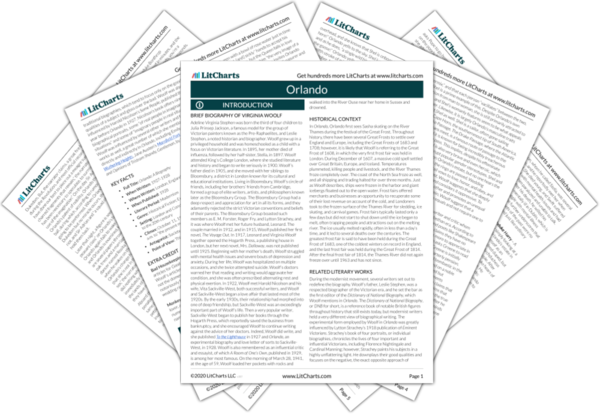The Shabby Man / William Shakespeare Quotes in Orlando
But there, sitting at the servants’ dinner table with a tankard beside him and paper in front of him, sat a rather fat, rather shabby man, whose ruff was a thought dirty, and whose clothes were of hodden brown. He held a pen in his hand, but he was not writing. He seemed in the act of rolling some thought up and down, to and fro in his mind till it gathered shape or momentum to his liking. His eyes, globed and clouded like some green stone of curious texture, were fixed. He did not see Orlando. For all his hurry, Orlando stopped dead. Was this a poet? Was he writing poetry? “Tell me,” he wanted to say, “everything in the whole world”—for he had the wildest, most absurd, extravagant ideas about poets and poetry—but how speak to a man who does not see you ? who sees ogres, satyrs, perhaps the depths of the sea instead?

Unlock explanations and citation info for this and every other Orlando quote.
Plus so much more...
Get LitCharts A+“Ah!” he said, heaving a little sigh, which was yet comfortable enough, “Ah! my dear lady, the great days of literature are over. Marlowe, Shakespeare, Ben Jonson—those were the giants. Dryden, Pope, Addison—those were the heroes. All, all are dead now. And whom have they left us? Tennyson, Browning, Carlyle!”—he threw an immense amount of scorn into his voice. “The truth of it is,” he said, pouring himself a glass of wine, “that all our young writers are in the pay of booksellers. They turn out any trash that serves to pay their tailor’s bills. It is an age,” he said, helping himself to hors d’oeuvres, “marked by precious conceits and wild experiments—none of which the Elizabethans would have tolerated for an instant.”

The Shabby Man / William Shakespeare Quotes in Orlando
But there, sitting at the servants’ dinner table with a tankard beside him and paper in front of him, sat a rather fat, rather shabby man, whose ruff was a thought dirty, and whose clothes were of hodden brown. He held a pen in his hand, but he was not writing. He seemed in the act of rolling some thought up and down, to and fro in his mind till it gathered shape or momentum to his liking. His eyes, globed and clouded like some green stone of curious texture, were fixed. He did not see Orlando. For all his hurry, Orlando stopped dead. Was this a poet? Was he writing poetry? “Tell me,” he wanted to say, “everything in the whole world”—for he had the wildest, most absurd, extravagant ideas about poets and poetry—but how speak to a man who does not see you ? who sees ogres, satyrs, perhaps the depths of the sea instead?

Unlock explanations and citation info for this and every other Orlando quote.
Plus so much more...
Get LitCharts A+“Ah!” he said, heaving a little sigh, which was yet comfortable enough, “Ah! my dear lady, the great days of literature are over. Marlowe, Shakespeare, Ben Jonson—those were the giants. Dryden, Pope, Addison—those were the heroes. All, all are dead now. And whom have they left us? Tennyson, Browning, Carlyle!”—he threw an immense amount of scorn into his voice. “The truth of it is,” he said, pouring himself a glass of wine, “that all our young writers are in the pay of booksellers. They turn out any trash that serves to pay their tailor’s bills. It is an age,” he said, helping himself to hors d’oeuvres, “marked by precious conceits and wild experiments—none of which the Elizabethans would have tolerated for an instant.”











